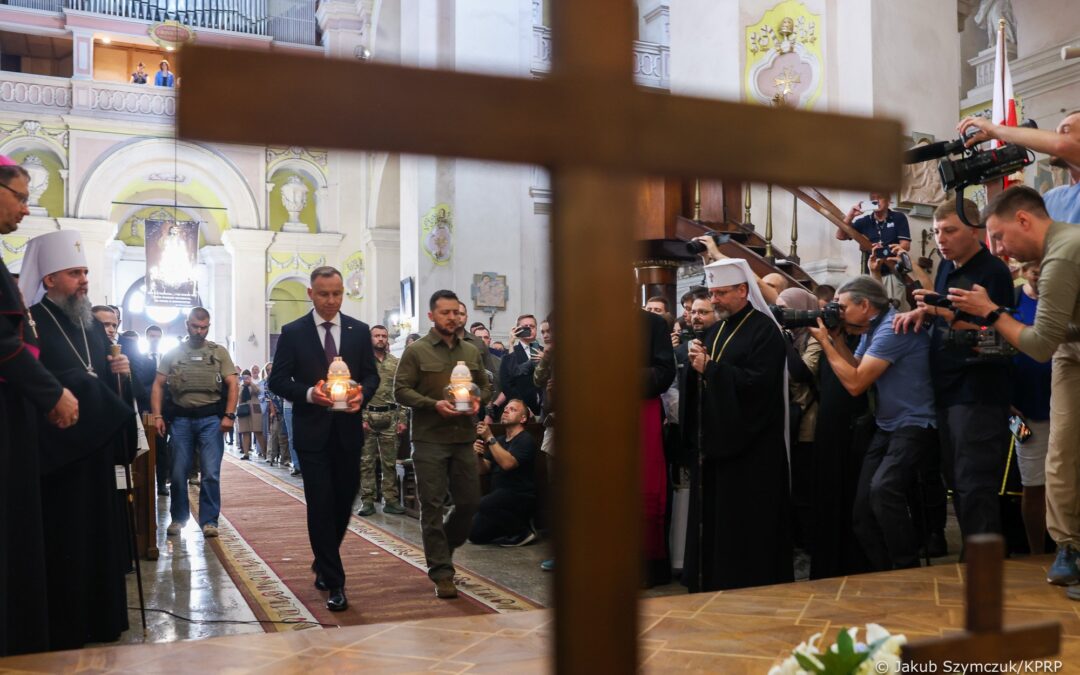In an important symbolic moment, Ukraine’s president, Volodymyr Zelensky, has joined his Polish counterpart Andrzej Duda to mark the 80th anniversary of the Volhynia massacres, during which Ukrainian nationalists murdered up to 100,000 ethnic Poles during World War Two.
The history of the massacres has regularly caused tension between two otherwise close allies. Poland regards them as a genocide, and has officially recognised them as such, but Ukraine rejects the use of that term.
This morning, Zelensky and Duda walked side by side down the aisle of Saint Peter and Paul Cathedral in Lutsk, northwestern Ukraine, before laying candles at the altar. Their visit to the city, which is the administrative capital of the Volyn province, had not been announced in advance.
Prezydenci @AndrzejDuda i @ZelenskyyUa wspólnie upamiętniają ofiary rzezi wołyńskiej. Więcej 🔜@tvp_info pic.twitter.com/NAyGyW11Fw
— Żaklina Skowrońska (@zaklinaskowron) July 9, 2023
“Together, we pay tribute to all the innocent victims of Volhynia!” announced the Polish president’s official Twitter account. “Memory connects us! Together we are stronger.”
A short ceremony was presided over in the church by Stanisław Gądecki, the head of Poland’s Catholic Church, and Sviatoslav Shevchuk, who leads the Ukrainian Greek Catholic Church. The two archbishops on Friday signed a joint declaration to mark the anniversary of the massacres.
The primate of the Orthodox Church of Ukraine, Epiphanius, was also present at the service, reports Polish state broadcaster TVP.
Polish-Ukrainian reconciliation requires the WW2 massacre of Poles by Ukrainians to be referred to as a genocide, says Poland’s most senior bishop.
He today signed a joint declaration on the massacres with the head of the Ukrainian Greek Catholic Church https://t.co/tB9o7kib0k
— Notes from Poland 🇵🇱 (@notesfrompoland) July 7, 2023
In May, Ukraine expressed anger after the spokesman for Poland’s foreign ministry suggested that Zelensky should issue a public apoligy for the Volhynia massacres to mark this year’s 80th anniversary.
However, tensions were eased later that month when the speaker of Ukrainne’s parliament, Ruslan Stefanchuk, made a landmark address to the Polish parliament, during which he acknowledged Poles’ pain over “the terrible events in Volhynia” and “expressed my sincere sympathy” to the victim’s families.
Some in Poland, however, believe that such actions do not go far enough, and have called for the Ukrainian authorities to explictly apologise for the massacres, to admit that they were a genocide, and to allow the exhumation and proper burial of victims.
The Polish authorities have also often expressed anger over the continued veneration in Ukraine of some nationalist leaders linked to the Volhynia massacres.
Ukraine's ambassador has criticised the "unacceptable" suggestion by Poland's foreign ministry spokesman that President @ZelenskyyUa should apologise for the Volhynia massacre, which saw up to 100,000 ethnic Poles killed by Ukrainian nationalists in WWII https://t.co/45QnIsTgpO
— Notes from Poland 🇵🇱 (@notesfrompoland) May 21, 2023
Main image credit: Jakub Szymczuk/KPRP

Daniel Tilles is editor-in-chief of Notes from Poland. He has written on Polish affairs for a wide range of publications, including Foreign Policy, POLITICO Europe, EUobserver and Dziennik Gazeta Prawna.




















